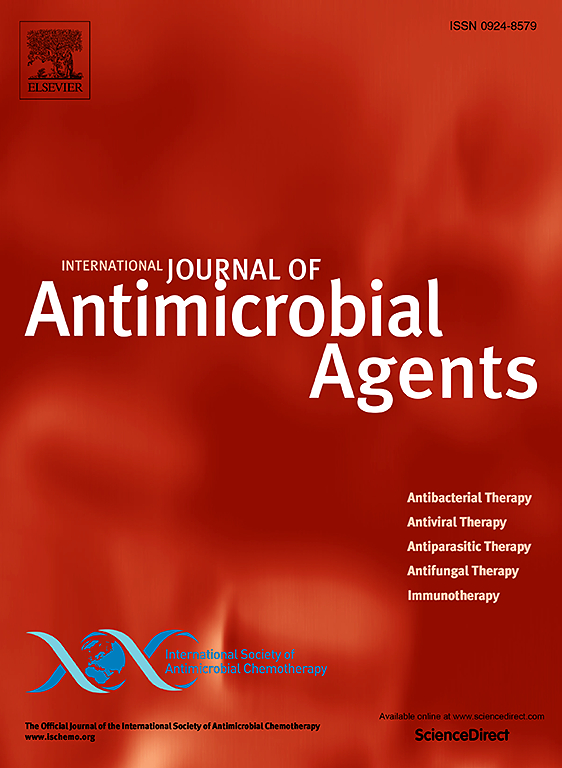直肠带菌者继发耐碳青霉烯类肠杆菌 (CRE) 感染的流行病学:发病率、风险因素及其与地理区域和年龄关系的荟萃分析。
IF 4.6
2区 医学
Q1 INFECTIOUS DISEASES
International Journal of Antimicrobial Agents
Pub Date : 2024-09-07
DOI:10.1016/j.ijantimicag.2024.107335
引用次数: 0
摘要
研究目的本研究旨在评估直肠带菌者继发 CRE 感染的发生率和风险因素,以及它们与地理区域和年龄的关系:对调查直肠带菌者CRE后续感染发生率和/或风险因素的研究进行了荟萃分析,并按地理区域和年龄进行了亚组分析。研究人员检索了 PubMed、Embase、Web of Science 和 Cochrane Library(发表时间从开始到 2024 年 1 月 31 日)。本研究已在 PROSPERO 注册,编号为 CRD42023444420:结果:在确定的 4459 项研究中,纳入了 24 项研究,共有 8188 名 CRE 直肠携带者。CRE后续感染的总发生率为20.6%(95% CI 15.9-25.8)。美国的发病率最高(23.6%,95% CI 14.2-34.5),其次是欧洲(20.9%,95% CI 12.5-30.8)和亚洲(19.8%,95% CI 12.7-27.9)。儿童的发病率(26.7%,95% CI 21.3-32.3)高于成人(19.8%,95% CI 14.9-25.2)。有 14 个因素与随后的 CRE 感染有关。在亚洲,最显著的风险因素是胃炎(OR 4.95 95% CI 1.87-13.11)。在欧洲,入住重症监护室是最重要的因素(OR 2.76 95% CI 1.14-6.65)。在美国,使用输尿导管(OR 4.33 95% CI 1.06-17.70)是主要原因。入住重症监护室在成人中最显著(OR 3.01 95% CI 1.80-5.02),而机械通气在儿童中最显著(OR 15.61 95% CI 4.39-55.47):结论:直肠带菌者继发 CRE 感染的风险至关重要。结论:直肠携带者继发 CRE 感染的风险至关重要,确定继发感染的风险因素有助于制定更有效的预防和控制措施,减少 CRE 感染。本文章由计算机程序翻译,如有差异,请以英文原文为准。
Epidemiology of Subsequent Carbapenem-Resistant Enterobacterales (CRE) Infection Among Rectal Carriers: A Meta-Analysis of Incidence, Risk Factors and Their Association With Geographic Region and Age
Background
This study aimed to assess the incidence and risk factors of subsequent carbapenem-resistant Enterobacterales (CRE) infection among rectal carriers, and their association with geographic region and age.
Methods
A meta-analysis of studies investigating incidence and/or risk factors of subsequent CRE infection among rectal carriers was conducted, with subgroup analyses by geographic region and age. PubMed, Embase, Web of Science, and Cochrane Library were searched (published from inception to 31 January 2024). This study is registered with PROSPERO (CRD42023444420).
Results
Of 4459 studies identified, 24 studies with 8188 CRE rectal carriers were included. The pooled incidence of subsequent CRE infection was 20.6% (95% CI 15.9–25.8). The highest incidence was seen in America (23.6%, 95% CI 14.2–34.5), followed by Europe (20.9%, 95% CI 12.5–30.8) and Asia (19.8%, 95% CI 12.7–27.9). Children had a greater incidence (26.7%, 95% CI 21.3–32.3) than adults (19.8%, 95% CI 14.9–25.2). Fourteen factors were associated with subsequent CRE infection. In Asia, the most notable risk factor was gastritis (odds ratio [OR] 4.95 95% CI 1.87–13.11). In Europe, admission to the intensive care unit was prominent (OR 2.76 95% CI 1.14–6.65). In the America, the use of a urinary Foley catheter (OR 4.33 95% CI 1.06-17.70) was dominant. Admission to the intensive care unit was most notable in adults (OR 3.01 95% CI 1.80–5.02), while mechanical ventilation was shown the greatest significance in children (OR 15.61 95% CI 4.39–55.47).
Conclusions
Risk of subsequent CRE infection among rectal carriers was critical. Identifying the risk factors for subsequent infection could help in developing more potent prevention and control measures to reduce CRE infection.
求助全文
通过发布文献求助,成功后即可免费获取论文全文。
去求助
来源期刊
CiteScore
21.60
自引率
0.90%
发文量
176
审稿时长
36 days
期刊介绍:
The International Journal of Antimicrobial Agents is a peer-reviewed publication offering comprehensive and current reference information on the physical, pharmacological, in vitro, and clinical properties of individual antimicrobial agents, covering antiviral, antiparasitic, antibacterial, and antifungal agents. The journal not only communicates new trends and developments through authoritative review articles but also addresses the critical issue of antimicrobial resistance, both in hospital and community settings. Published content includes solicited reviews by leading experts and high-quality original research papers in the specified fields.

 求助内容:
求助内容: 应助结果提醒方式:
应助结果提醒方式:


